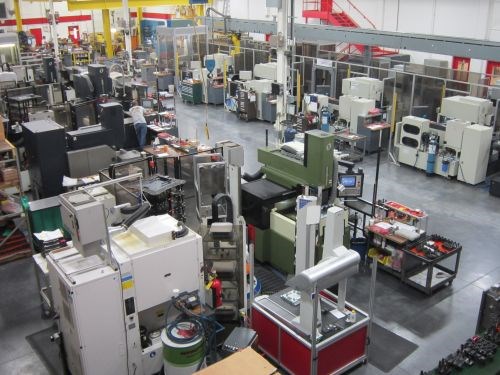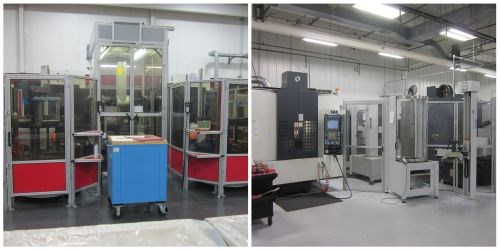Implementing Automation
The first two shops I’ve visited as an editor for MoldMaking Technology have made major strides in implementing automation. They’ve also expanded their range of capabilities to cover more than just tooling.

MGS Mfg. Group relies heavily on automation. This includes the gantry robot visible at the top right, which services six wire EDMs used to produce electrodes, and various cells that integrate equipment including sinker EDMs and high speed machining centers with robots and CMMs.
Upon leaving MGS Mfg. Group after my first shop tour as an editor for MoldMaking Technology, I was struck by the fact that I’d seen the entire production process, from initial product design to machining of the tooling and electrodes all the way through final injection molding, in a single location. All of these operations span two buildings at the company’s campus in Germantown, Wisconsin. One houses offices and the programming and mold manufacturing operations, and the other houses a range of injection molding presses as well as assembly, storage and shipping.
MGS is big. The company’s website says it operates the 12th largest tool shop in North America as well as five separate injection molding facilities, including plants in Ireland and Mexico. Given the company’s size and resources, I’d initially assumed that this sort of single-source operation was unusual. However, the next shop I visited had also moved to bring tooling and molding under the same umbrella. Rockford, Illinois-based Industrial Molds Group (MMT’s 2012 Leadtime Leader Award winner) operates a division called Pyramid Plastics that specializes in complex injection molding work. Unlike the case with the presses at MGS, most of Pyramid’s production molding operations are performed for customers not associated with Industrial Molds. Nonetheless, both MGS and Industrial Molds cite their broad range of capabilities as key to success (click here for the latter company’s perspective on a new facility for Pyramid). In the coming months, I’ll be curious to see whether other industry shops are pursuing similar strategies.

Automated cells at MGS (left) and Industrial Molds (right).
Both shops have also made major strides in implementing automation. Used for hard milling jobs at MGS, the cell in the left-hand picture consists of two robot-fed Makino V33i high-speed VMCs and a CMM (learn more here). Meanwhile, Industrial Molds credits the cell in the right-hand picture as a major factor in achieving an eight-week average lead time. Also used for hard-milling cavities, it consists of an Erowa robot system and two Makino high speed machining centers: an F-5 and an S56. Among the keys to the cell’s effectiveness is the fact that any given part moves through the shop on the same pallet, which features an ID tag that enables the cell's machines to work from the same coordinate system as upstream equipment. Thus, the cell’s single operator doesn’t have to worry about re-indicating every part, and he knows which tools to load in the machines’ ATCs before the pallet arrives, among other advantages.
Both MGS and Industrial Molds have been covered multiple times in MoldMaking Technology, and the primary purpose of these visits was to “get my feet wet.” Still, I could envision returning to either company for a more in-depth article. Meanwhile, I expect to visit many more mold manufacturers in the near future. If those operations are anything like these two, the outlook for the American mold-building industry is undoubtedly bright.
Related Content
How to Automate Process and Design
Moldmakers can improve their operations and stop wasting time by taking these six steps for process and design automation.
Read MoreOvercoming Barriers to Automation Integration in Precision Moldmaking
It’s easy to imagine the advantages automation offers the moldmaking process, but it's challenging to change one’s mindset, develop a plan and invest.
Read MoreAchieving Flexible Capacity with Automation
This high-mix, low-volume manufacturer embarked on a year and a half program to introduce robotics to its manufacturing process.
Read MoreAdvancing Moldmaking and Plastics: Trends in 3D Printing, Automation and Sustainability
NPE 2024 showcased the latest trends and technologies in innovation, efficiency and sustainability for moldmakers and molders, featuring advancements in 3D printing, automation, design and virtual reality/augmented reality/artificial intelligence.
Read MoreRead Next
How to Use Continuing Education to Remain Competitive in Moldmaking
Continued training helps moldmakers make tooling decisions and properly use the latest cutting tool to efficiently machine high-quality molds.
Read MoreReasons to Use Fiber Lasers for Mold Cleaning
Fiber lasers offer a simplicity, speed, control and portability, minimizing mold cleaning risks.
Read MoreHow to Use Strategic Planning Tools, Data to Manage the Human Side of Business
Q&A with Marion Wells, MMT EAB member and founder of Human Asset Management.
Read More


















